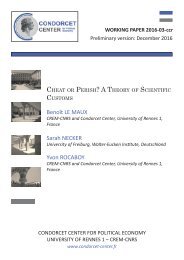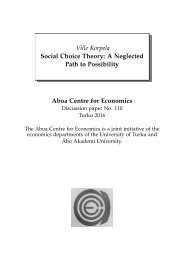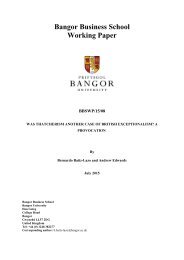MEMORANDUM
n?u=RePEc:hhs:osloec:2016_018&r=hpe
n?u=RePEc:hhs:osloec:2016_018&r=hpe
Create successful ePaper yourself
Turn your PDF publications into a flip-book with our unique Google optimized e-Paper software.
express myself clearer than that.” (Schumpeter to Leontief, 21 February 1930, transl.<br />
by ob).<br />
The statement perhaps said more about Schumpeter than about Leontief. Schumpeter<br />
had his own worries and didn’t share them all with Leontief. His years in Vienna had<br />
given him many foes, particularly due to Schumpeter’s brief and unsuccessful career as<br />
banker. He was misjudged on untrue rumors. 118 But he seemed to think that the situation<br />
would soon change and then he would be better able to exert influence. In Bonn he knew<br />
that any protégé of his would be blocked from achieving habilitation. One of his foes was<br />
indeed Werner Sombart who eventually would block Schumpeter from being offered a<br />
chair at Berlin University. That would also impact on Leontief in an unforeseen way, as<br />
we shall see.<br />
Schumpeter added that what he just stated had nothing to do with the question of<br />
whether Germany was the right place for Leontief in the future. Schumpeter would make<br />
no judgment on that, especially as it did not fall under his duties to scare a promising talent<br />
away from Germany. In Schumpeter’s view Leontief’s prospects in Germany were not too<br />
bad, if the next two-three years could be bridged over in a way which did not expose him<br />
or tie him up in any direction. 119<br />
Schumpeter’s advice was carefully set out but Leontief may not have been able to see<br />
fully through it. Of course, Schumpeter was not able to see better than others the ominous<br />
turn events would take in Germany within three years. Schumpeter at this time considered<br />
his own future to be in Germany and that that would be the best choice for Leontief too.<br />
(That they would be colleagues at Harvard within three years was hardly imaginable for<br />
any of them at this time.)<br />
In line with Schumpeter’s advice and his own inclinations Leontief re-joined the staff<br />
of the Kiel Institute from 1 April 1930. The project he had got approved in his contract<br />
was a closer investigation of the structure and development of the iron market. It had been<br />
studied along with other markets in Versuch but not with very satisfactory results. His<br />
project was in the Institute jargon from the very beginning spoken of as the Eisenaufsatz<br />
(“Iron study”). To make his demand and supply analysis work for iron and other industrial<br />
raw materials had become of major importance for Leontief. The problems were all on the<br />
supply side.<br />
Leontief wrote to Schumpeter in May 1930 to tell him what he was working on after<br />
rejoining the Kiel Institute, intimating that his choice of looking closer at the iron market<br />
had not been done without some doubts. He regarded the risk of failure as far from<br />
negligible but on the not too demanding field of agricultural products there was hardly<br />
118 See Stolper (1994).<br />
119 Schumpeter to Leontief, 21 February 1930, transl. by ob.<br />
49





